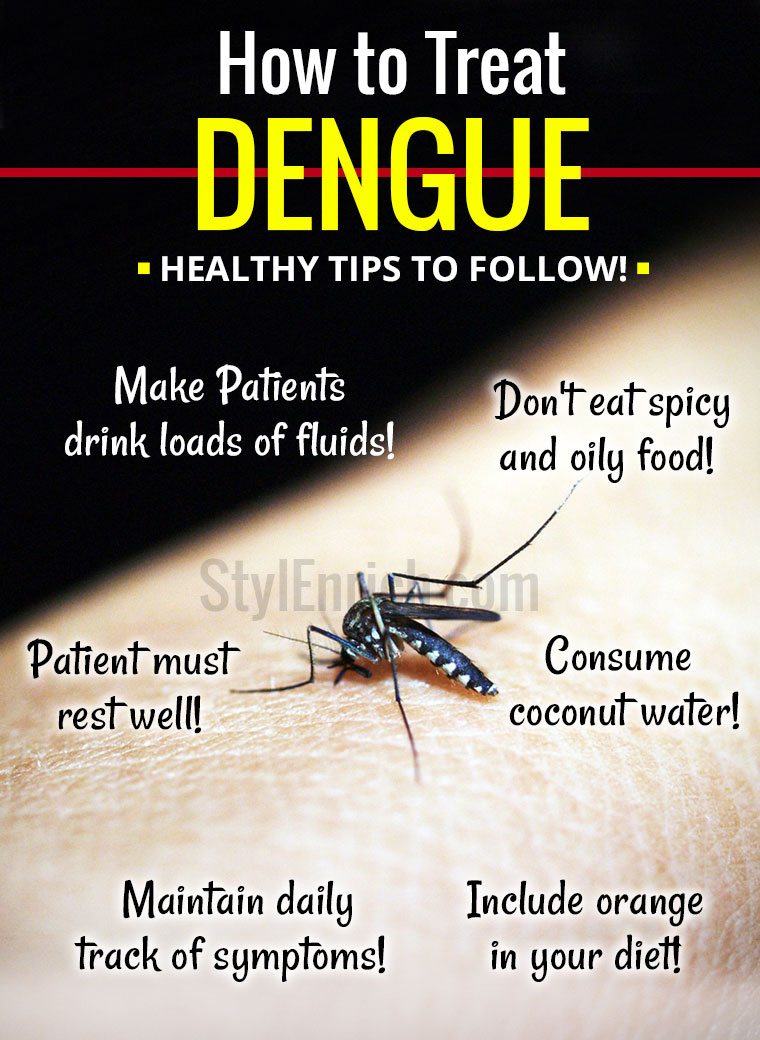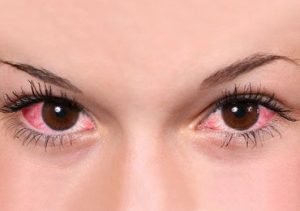Dengue occurs due to the Dengue virus which is transmitted through Aedes mosquitoes. This is usually found in regions of Western Pacific, South and Central America, Africa and parts of southeast Asia. I’m sure you’d not want to be affected by this deadly virus. That is the reason I’ve written this article on dengue treatment just for you!
Symptoms
Joint pain, headache, high fever and skin rashes that appear like measles are some of the major symptoms that come with Dengue.
How to Take Care of an Affected Person?
In order to take care of the person who is affected by Dengue, here are the steps you need to follow
Phase One: Diagnosing for Infection
Step 1: Incubation Period
You need to be wary of the incubation period. It usually takes nearly one week for the symptoms to show up after an individual gets infected. The found symptoms in the infected person will determine how severe the infection is and what the treatment plan must be.
If you are bitten by Dengue carrier mosquito, the symptoms will show up in seven days and will last for about ten days maximum.
Step 2: Check for Warning Signs
You need to check if the person is displaying real serious caution signs. Dengue is classified into two major categories.
Dengue Without Warning Signs
This one is generally found through the fever’s presence along with two more symptoms, namely vomiting and nausea. Rashes will occur that will make the face turn red and develop red patches upon legs, arms, back, and chest. This is followed by severe body pain and lowered counts of white blood cells, and also swelling of those glands behind the ear and also the neck.
Dengue With Warning Signs
In here, the patterns shown are any one or more among these; Persistent vomiting. Abdominal pain, fluid accumulation in lungs and abdomen, gum bleeding, bleeding from the nose, enlarged liver and restlessness or lethargy.
Such caution signs may mean that the infection us serious and might also lead to organ failure, in other words, known as Dengue Hemorrhagic Fever. If anyone or more than one symptom from the above occur, the following two days of infection could be fatal if not hospitalized properly.
Step 3: Determine Severity
You must next go for determination of the severity of Dengue. Severe infection from the virus will have symptoms from both of the above-mentioned categories along with any of below-mentioned ones.
- Extreme blood or bleeding through urine
- Extreme accumulation of fluids in lungs and abdomen
- Unconsciousness
- Further accumulation of fluid by involving organs like heart, leading to lowered pressure and hiked pulse rate
- If these symptoms are observed, you need to take the affected person to a nearby hospital at the earliest.
Step 4: Visit for a Checkup
Patients suffering from severe Dengue or Dengue along with warning signs must visit the hospital at the earliest. Those without the caution sign must visit a hospital too, wherein a thorough checkup must be done for confirmation of the infection.
Step 5: Learn About the Dengue Treatment
Treatment could happen back in the home or at the hospital. For extreme cases or cases wherein the person shows warning signs, the infection should be dealt with in a hospital itself.
Treatment in the home is possible only if the patient meets these requirements.
- No warning signs must be present.
- The patient is able to consume sufficient fluids orally.
- Urine can be passed by the patient in at least every six hours.
You must note that there isn’t any particular cure or medication for the disease. Hence, the treatment will solely be focused on dealing with the symptoms.
Phase Two: Dengue Treatment at Home!
Step 1: Atmosphere Must Be Mosquito Ridden and Clean
When you are treating a Dengue infected person in the home, it is essential that you avoid any more contact with any mosquitoes since the infection could be passed from one to another through those mosquitoes. Basically, if you control mosquitoes, you can avoid others from getting sick.
- Use door screens and window screens back in the home to avoid entering of the mosquitoes.
- Have mosquito nets over you while napping.
- Put on clothes which reduce exposure of skin to the mosquitoes.
- You can make use of mosquito repellant on your exposed skin too. Repellants such as Picaridin, DEET are very much effective. Kids must don’t get their hands on these repellents. You, as adults, must put the repellants on kids by your own. However, make sure you don’t use the repellant on a baby less than two months.
- Avoid mosquito breeding through draining of stagnant water, all around the home and storage containers frequently.
Step 2: Visit Hospital Everyday
Dengue Patients must visit hospitals. Every day, you need to take the patient to a hospital wherein the blood count and fever could be assessed. The patient needs to visit the hospital every day until the fever prevails.
Step 3: Patient Must Rest Well
The patient can be allowed to do his earlier activities, especially during that convalescence long period.
Since the infection generally causes major lethargy and tiredness, it is vital that Patients obtain ample rest and later bounce back into the regular life.
Step 4: Give the Patient Paracetamol or Acetaminophen
This drug will aid in lessening the fever. Four of these tablets must be given to that infected person in a day. Keep the patient away from ibuprofen, aspirin or many anti-inflammatory and nonsteroidal drugs. They have the ability to enhance the bleeding risks in people suffering.
Step 5: Make Patients Drink Loads of Fluids
Patients must be made to drink loads of water, oral dehydration solutions and fruit juices in order to avoid dehydration caused by vomiting or fever. Ample intake of fluid reduces the chances of Dengue patient getting hospitalized.
- Women and men must be drinking up to three liters of water per day
- Girls and boys must drink nearly 2.7 liters of water per day
- Infants must drink about 0.8 liters of water per day
You could also prepare papaya leaves juice for Dengue infected people. The extracts of papaya leaves are said to enhance the count of platelets in Dengue infected people.
Step 6: Maintain a Daily Track of Symptoms
You need to have a daily tracker that will let you see worsening of the infection symptoms. It is vital that you check on babies and children closely as they are more prone to developing severe cases of the infection. Have a clear record of the following.
- The body temperature of patients. Temperature varies throughout the day and you must record temperature at sake time every day since that can make for a more valid record.
- Consumption of fluids must be recorded. Make the patient intake fluid from same cup every time as it will help you record the total amount of fluid consumed.
- Urine output must be checked as well. Have the patient urinate in a jar. Measure and take note of the quantity of urine passed every time.
Step 7: Take them to the Hospital When Symptoms Get Worse
Go to the nearest hospital whenever the infected person shows any of these symptoms.
- Severe pain in the abdominal region
- Continuous vomiting
- High fever
- Lethargy
- Clammy and cold extremities
- If the patient is unable to urinate regularly
- Bleeding through genitals, gums or nose, red patches or spots on the skin
- The problem in breathing as a result of fluid accumulation in lungs
Well, that is about how you must take care of a patient who has been affected by Dengue. Since it is a serious disease, nothing must be taken in a lighter note!
Natural Remedies For Dengue Treatment
As the old saying goes, it is always better to prevent than going for the cure. Whenever you find slightest of the symptoms, you can always work on preventing the disease from getting severe. Here are some home remedies for dengue treatment you can follow in order to deal with Dengue or its symptoms. I will mention some natural foods that are really great against the disease. Read on!
1. Orange to Deal With Dengue
We all know orange is filled with vital vitamins and nutrients. They are enriched with vitamin C that is an essential antioxidant. The fiber content in oranges makes the fruit great for dealing with indigestion too. Include this tangy fruit and its juice in your diet if you want to deal with dengue and its symptoms.
2. Papaya For Dengue Treatment
This fruit is so much healthy, even in general! It has got so many medicinal qualities. Across many cultures, this fruit has been used as a great home remedy studies have shown that the Papaya seeds are toxic against the Aedes mosquitoes. Other researchers say that papaya has the ability to trigger quicker production of platelets among Dengue infected people. You just have to crush some papaya leaves and make a juice out of it. You can consume this twice in a day in order to beat the disease!
3. Say No to Oily Food For Dengue Treatment!
Stomach issues are one among the major symptoms of Dengue. You need to ensure that you don’t keep eating spicy food and oily food if affected since it can make your situation from bad to worse!
4. Porridge
This delicious cereal is a renown option for breakfast all across the globe. Rich fiber content and nutritional value of the food ensures that you get enough strength to combat the disease. Porridge can be easily swallowed and digested too. Just make it a point that you eat more porridge whenever you’re down due to the disease.
5. Herbal Tea
This one can aid in decreasing the symptoms seen in Dengue fever. You can go for flavors such as ginger, peppermint or cardamom. Ginger has got antioxidant and anti-inflammatory properties which help in decreasing Dengue fever. The herbal tea which is brewed using euphorbia leaves can treat the disease really well. This plant is grown in abundance all over southeast Asia.
6. Coconut Water
Dengue generally causes dehydration. During these times, coconut water is one of the best things that can serve Dengue patients since it is purely a water source of nature containing all needed electrolytes and vital minerals. Consuming coconut water keeps the fluid levels in patient’s body under control. Hence, coconut water is a must for dengue treatment which you should be adding to your diet while suffering from symptoms of Dengue.
7. Vegetable Extracts
You could deal with the symptoms of this disease with consumption of freshly made vegetable juices. Cucumber, carrot and various leafy greens are especially great for dealing with the symptoms. These vegetables are full of required minerals and vitamins which aid in boosting immunity and decrease the agony of the patient.
8. Soups
This is another of the best foods you can consume while treating the symptoms of the infection. This will help in inducing hunger and can also relieve joint aches. Soups have fewer spices and thus very easy for digestion as well as bowel movements.
9. Fruit Juice
As I’ve discussed earlier, vitamin C is an efficient antioxidant. It is capable of triggering production of collagen and helps in boosting your immunity system. Fruits such as pineapple, strawberry, orange, guava as well as kiwi hike the lymphocytes production in the body that can fight the viral disease. If you are dealing with the symptoms of Dengue, you might as well fight it with fresh fruit juices.
10. Neem Leaves
These leaves are very popular owing to their medicinal qualities. They aid in restricting the growth and spreading of the Dengue virus. This is the reason neem leaves are one among the renown natural remedies to cure the problem!
Conclusion
That is about the natural remedies for dengue treatment. I hope that these natural diets will help you in dealing with the dengue symptoms. Do let me know if you have any homemade remedies that you know which could help in Dengue treatment. Feel free to comment in the comment section below!
Read more – Best Acupressure Points for Headache & Migraines!




























